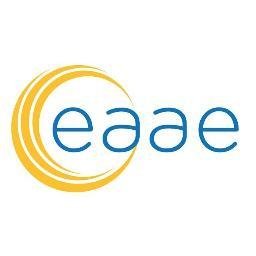
European Association of Agricultural Economists
@AgriEconEurope
Followers
2K
Following
63
Media
14
Statuses
227
The EAAE brings together agricultural economists and others interested in agricultural and rural issues, promoting knowledge and fostering exchange.
Joined June 2020
The masterclass webinar presented by Yann de Mey from WUR: "Analysing Risk in Agriculture: An Overview of Defining, Measuring, and Characterizing Farm-Level Risk Exposure" takes place this Tuesday, 24 September, 11:00 – 12:00 hrs (CET). Link provided to EAAE members. @YanndeMey
0
1
6
Q Open, the fully #OA journal from @AgriEconEurope seeks papers on building supportive environments and wellbeing in applied economics. Learn more about the topic and submit your abstract before September 30: https://t.co/rsMYTv28Fv
0
3
2
🗓️Mark your calenders for the XVIII EAAE congress! More information here: https://t.co/3Vb9g5ucDo
0
8
19
Did we learn from the replication crisis? Find out in
0
0
1
Call for Papers: ERAE is looking for papers that address different aspects of bioeconomy supply and value chains within the context of current global change. Deadline: July 30, 2024. More information here:
academic.oup.com
Bioeconomy supply and value chains within the context of a changing world order Recent events at the international level, such as the war in Ukraine, the confl
0
4
7
The early bird registration for the 189 EAAE Seminar on EU enlargement by (post-war) Ukraine will end July 15 (Monday). If interested, register here:
0
0
0
Check out the new issue of Q Open, Volume 4 (1), with articles on consumer preferences for lab-grown meat and insect-based food, reduced pesticide agriculture, dairy farmers' concern for dairy calf welfare, and many more. 👉 https://t.co/d2hQzfuExY
0
1
8
The detailed #ICAE2024 Program is now available. With over 800 presenters from all over the world, this Conference will discuss what needs to be done for a successful Transformation of Agri-Food Systems. Registration remains open. https://t.co/sZj9WwzxpN
0
16
29
45 days to #ICAE2024: Plenary 5 will be on Gender in Agri-Food Systems and will be chaired by Bina Agarwal. The session speakers will be @jemimah_njuki, @soniaakterspp, @agnesquis, and @Cheryl_Doss. The program Chair @MatinQaim, invites all #AgEcons to @icae2024 #MeetInDelhi
0
3
7
🥳New paper in EuroChoices on regulatory choices for antibiotial use reductions in European Animal Food Reduction:
onlinelibrary.wiley.com
Reducing antimicrobial use (AMU) stands as a pivotal global strategy in combating antimicrobial resistance (AMR) within the realm of food animal production. We conducted an extensive review of the...
0
0
0
Special issue of Q Open on evidence-based agricultural and food policies has been published with important insights on methodological and data issues. Thanks @elbenninadja @RobertFinger1 and Christian Grovermann. https://t.co/MlKeLWofAo
0
4
8
What is probabilistic programming and is it useful for AgEcon? Getting insights from the keynote by Thomas Heckelei at the #eaae2023rennes congress. @eaae2023_rennes @heckelei
0
1
10
Miranda Meuwissen speaking about the resilience of farm systems at the #EAAE2023Rennes congress. @eaae2023_rennes
0
0
16
What does it mean to digitalize the food value chain? Keynote by Kristina Šermukšnytė-Alešiūnienė #eaae2023rennes
0
0
10
Three levers to achieve lower GHG emissions frm food systems.
Three levers to achieve lower GHG emissions in food systems, according to @MJansenEcon, @eaae2023_rennes
0
0
3
The #EAAE2023Rennes congress is a great opportunity for a meeeting among liaison officers in various European countries and discuss how to make make the EAAE‘s activities more effective. @eaae2023_rennes
0
1
8
In the second plenary sesssion at the #EAAE2023Rennes congress Thom Jayne speaks about problems in strengthening National Research and Extension Systems in subsaharan Africa.
0
0
6
What do farmers think about climate change mitigation? Check out the article by Doris Läpple in the latest @eurochoices issue:
onlinelibrary.wiley.com
The adoption of new practices by farmers is one of the key strategies to lower greenhouse gas (GHG) emissions from food production. In this context, effective knowledge transfer systems are essenti...
0
4
5
How does risk perception of farmer−herder conflicts influence production decisions in rural households in Nigeria? Amaka Nnaji, Nazmun Ratna and their colleagues answer this question in the latest #ERAE issue. Check it out! 👇 https://t.co/OLGhjTRg1L
academic.oup.com
Abstract. This paper investigates the influence of the risk perception of farmer−herder (FH) conflicts on rural households’ production decisions. Extending
0
0
3









